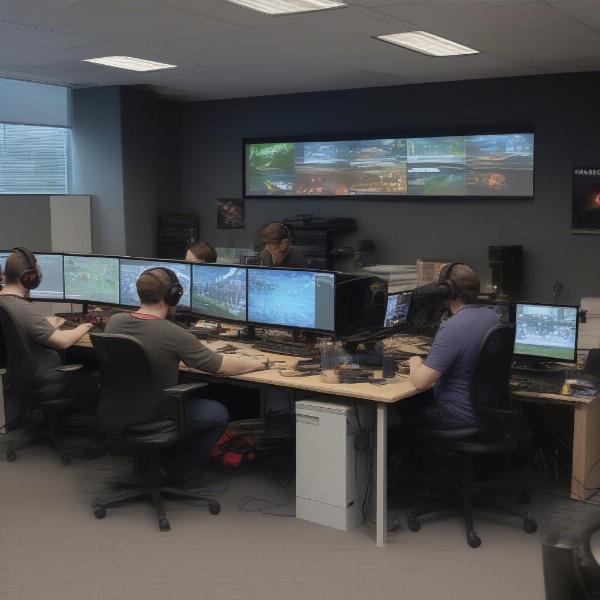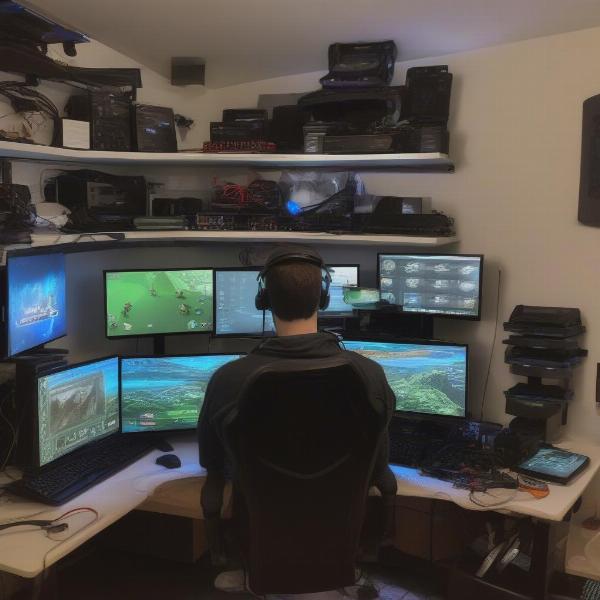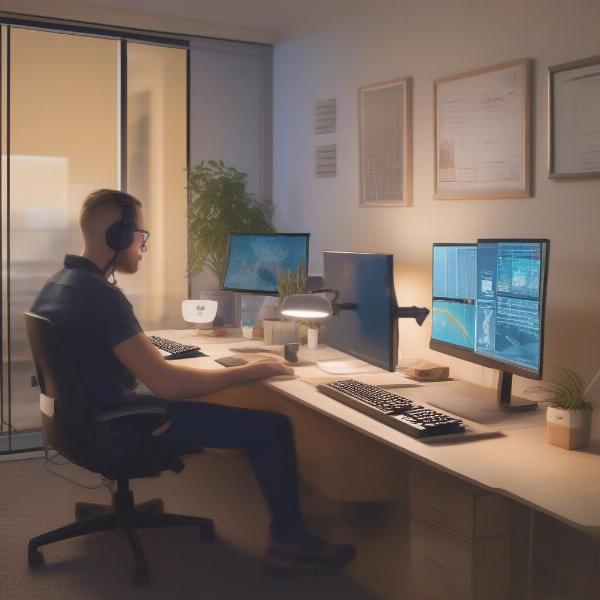The world of game testing, a crucial part of the gaming industry, often brings up questions about work environments. At SupremeDuelist.blog, we’re diving into a frequently asked topic: “Can Game Testers Work At The Office?”. This article will explore the various work settings for game testers, analyzing the pros and cons of in-office and remote work to give you a complete picture of the possibilities within this profession.
This analysis will cover not only the traditional office setting but also consider the rise of remote work, which has significantly impacted many sectors, including gaming. We’ll be exploring the nuances, offering insights into which work model might be more suitable depending on the company and the individual preferences of the game testers themselves.
The Traditional Office Setting for Game Testers
Historically, the majority of game testers were stationed in an office environment, which is still commonplace today. The main advantage of this set-up is fostering a collaborative atmosphere. Teams can interact directly, which can speed up communication and the debugging process. Working in close proximity to developers, designers, and other testers can result in real-time feedback loops, benefiting everyone working on the project.
This structure often provides a structured working schedule and access to dedicated testing equipment. Testers might benefit from specialized hardware, software, and tools that are only available within the company’s premises. For junior testers, this can be an invaluable experience, offering direct mentorship from more experienced colleagues. This environment can also boost team morale by fostering a sense of belonging and creating stronger personal bonds.
However, the traditional office also presents its limitations. Commuting, rigid schedules, and potential distractions within the office can lead to fatigue or reduced productivity for some individuals. Not everyone thrives in a structured, office-bound setting, which might affect job satisfaction and overall efficiency.
 Game Testers Working at the Office
Game Testers Working at the Office
Key Advantages of In-Office Game Testing:
- Direct Team Interaction: Faster communication and collaborative debugging.
- Access to Resources: Specialized hardware, software, and testing tools.
- Mentorship Opportunities: Direct learning and guidance from senior testers.
- Team Morale: Enhanced sense of belonging and stronger team bonds.
Disadvantages of In-Office Game Testing:
- Commuting Challenges: Time and cost associated with travel.
- Rigid Schedules: Limited flexibility in working hours.
- Potential Distractions: Office environment can lead to reduced focus.
The Rise of Remote Game Testing
The rise of remote work has opened up new possibilities within the game testing field. Remote testing allows game testers to work from home, providing greater flexibility and autonomy. This model can be attractive to many, especially those who value work-life balance or need to accommodate other commitments. The global talent pool for game testers has greatly expanded due to the flexibility offered by this working model.
Companies benefit from hiring testers from different geographical locations, meaning they get diverse perspectives and a wider pool of available talents. Remote work can lower overhead costs for companies, as they no longer need to pay for office space and utilities. Remote testers can often set their own working hours within defined parameters, which is beneficial for individuals with varying energy patterns or time zone differences.
However, remote game testing can have drawbacks. Communication can sometimes be slower and less direct than in an office environment. There might be issues with isolation, hindering team cohesion and mentorship opportunities, especially for newer members. Maintaining a secure and dedicated workspace at home is another challenge, and distractions might be more difficult to control.
 Remote Game Tester Working From Home
Remote Game Tester Working From Home
Key Advantages of Remote Game Testing:
- Flexibility: Greater control over working hours and location.
- Wider Talent Pool: Access to diverse talent from various locations.
- Cost Savings: Reduced overhead for companies.
- Better Work-Life Balance: More personal time and autonomy.
Disadvantages of Remote Game Testing:
- Communication Issues: Slower and less direct interaction.
- Isolation and Reduced Team Cohesion: Difficulty in building team bonds.
- Distractions and Focus: Challenges in maintaining a dedicated workspace at home.
- Security Concerns: Potential risks with remote access to confidential information.
Hybrid Work Models for Game Testers
Many companies today adopt a hybrid work model, which combines both office and remote work. This approach aims to balance the benefits of each setup while minimizing their drawbacks. Testers might work in the office for some days each week, focusing on team meetings and collaboration, while having the option to work remotely for the rest of the time. This offers flexibility and structure, catering to varied work styles.
Hybrid models can improve employee satisfaction and retention by providing a middle ground. Companies can save on office space while still creating a collaborative culture. Game testers can enjoy the benefits of flexible schedules without totally isolating themselves from their teams.
Hybrid working, however, requires a robust infrastructure for both onsite and remote workers. Clear communication protocols must be in place. This setup requires efficient tools for collaboration, regular check-ins, and a sense of inclusion for all team members, regardless of where they are working. Finding the right balance is essential for a hybrid model to be successful.
 Hybrid Work Setup for Game Testers
Hybrid Work Setup for Game Testers
Advantages of a Hybrid Work Model:
- Balanced Approach: Combines the benefits of in-office and remote work.
- Flexibility and Structure: Catered to diverse work styles.
- Improved Employee Satisfaction: Enhances job satisfaction and retention.
- Cost Savings and Collaboration: Efficient resource use while maintaining teamwork.
Challenges of a Hybrid Work Model:
- Requires Robust Infrastructure: Essential for smooth transition between onsite and remote work.
- Clear Communication Protocols: Need to establish strong communication strategies.
- Consistent Inclusion: Ensuring all team members feel equally connected.
- Finding the Right Balance: Fine-tuning the proportion of office and remote work.
Which Model is Best for Game Testers?
So, can game testers work at the office? Absolutely, they can, and as we’ve seen, it depends greatly on the specific needs of the company and preferences of the individual. The “best” work model is not one-size-fits-all. It depends on several factors, including the company’s culture, project requirements, and the individual preferences of game testers. Some game testers may thrive in the collaborative and structured environment of an office, while others prefer the autonomy and flexibility of remote work.
- Company Culture: Is the company very collaborative or more task-oriented? A company with a culture built on in-person collaboration might favour on-site positions, while a more independent culture might fit remote work better.
- Project Needs: Some game testing projects may require closer, more hands-on teamwork. An office-based approach might work better for these. Other projects, such as large-scale playtests, might be conducted remotely.
- Individual Preferences: Some game testers may prefer the structure and social interaction of the office, while others are more comfortable working independently from home.
Ultimately, game testers can find success in various work environments. The key is for both the company and the game tester to consider what is most effective for the project and the individuals involved. What is important is to find the right balance, whether that be an office-based, remote, or hybrid model, to ensure everyone is effective and happy in their roles.
Frequently Asked Questions About Game Tester Work Locations:
Q: Can game testers work from home?
A: Yes, many game testers work from home, enjoying the flexibility and autonomy that remote work offers. This has become increasingly common, especially in recent years.
Q: What tools do game testers need to work from home effectively?
A: They need reliable internet, a secure computer setup, communication tools like Slack or Discord, project management software, and sometimes access to specific game builds or testing hardware.
Q: Is it common for game testers to work in an office environment?
A: Yes, working in an office is still a very common practice, allowing for direct communication and team collaboration, along with access to company-specific resources and mentorship.
Q: What is a hybrid work model for game testers?
A: A hybrid model combines working in the office for some days and working remotely for others, offering flexibility and allowing for some in-person interaction.
Q: How does work location affect communication among game testers?
A: In-office settings generally facilitate easier, more direct communication, while remote work may require more formalized communication tools and structured check-ins to remain effective.
Q: What is better for new game testers: working from the office or at home?
A: Generally, new game testers benefit more from working in the office, as it offers mentorship and more direct access to resources. However, if the remote option is structured well, then this can also be a great way to start.
Q: What are some of the drawbacks of remote working for game testers?
A: Remote working can sometimes result in reduced team cohesion and feelings of isolation, as well as potential difficulties in maintaining focus and controlling distractions.
“In today’s gaming industry, the ability to adapt to different working environments is crucial. Companies and testers alike are continually assessing the best ways to collaborate effectively, and flexibility is key,” – Says Dr. Anika Sharma, a leading organizational psychologist focusing on the gaming industry.
“Hybrid models are becoming more popular, since they combine the advantages of both in-office interaction and remote flexibility. Game testing is a fast-evolving field and these adaptions are necessary for success,” – Explains Johnathan Davies, a veteran game tester with over 10 years of experience.
“A successful work setup depends a great deal on the kind of projects you’re running and how your team functions. It is not as simple as saying one model is superior to another, the most important part is a robust process and clear communication”, adds Maria Rodriguez, a senior game project manager.
Conclusion
In conclusion, the question of whether “can game testers work at the office” is not a simple yes or no. Game testers can certainly work in an office, remotely, or in a hybrid model, and each setup has its own advantages and disadvantages. The choice of work environment greatly depends on the specific company, project needs, and individual preferences. As the gaming industry evolves, it is vital for both game testers and companies to remain flexible and adaptable. This ensures effective collaboration and the highest quality game testing, no matter where the work is being done.
At SupremeDuelist.blog, we’ll continue to explore and analyze these trends, bringing you insightful and up-to-date information about the gaming industry. Stay tuned for more in-depth content designed to enhance your understanding of the game testing landscape. We welcome your questions and comments; please keep reading to stay on top of the game.
Leave a Reply